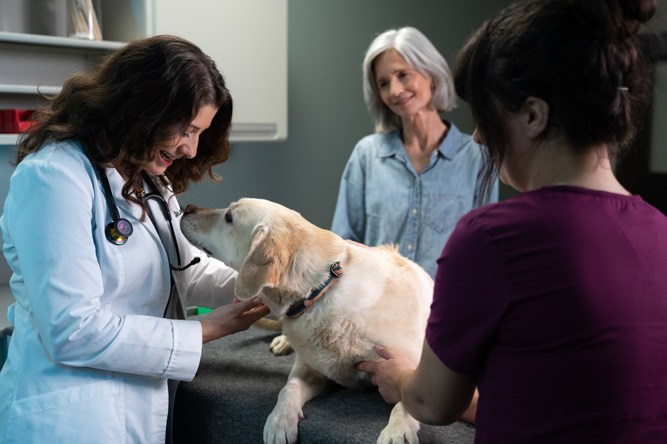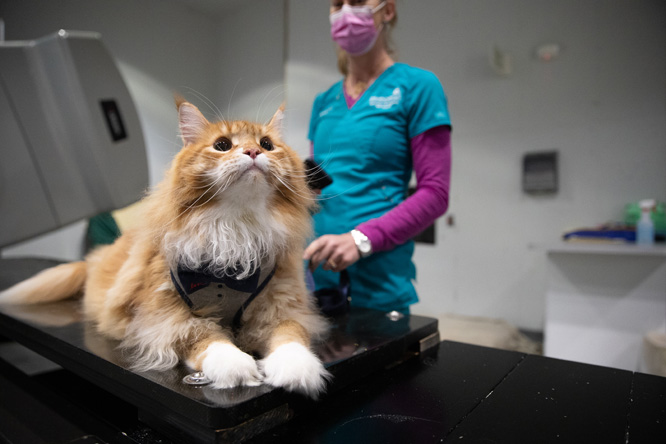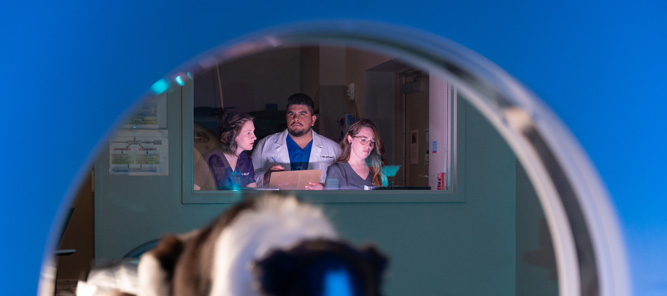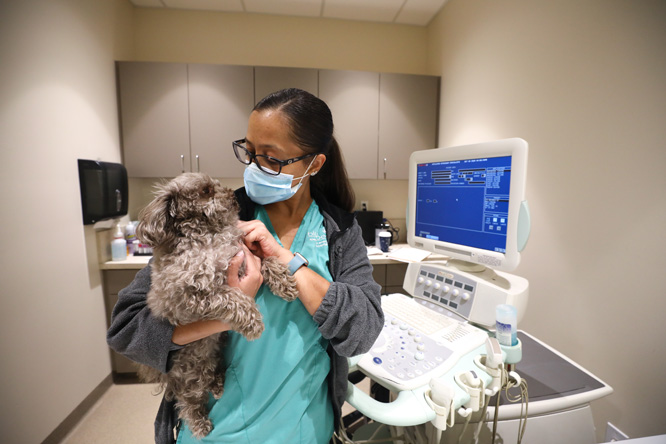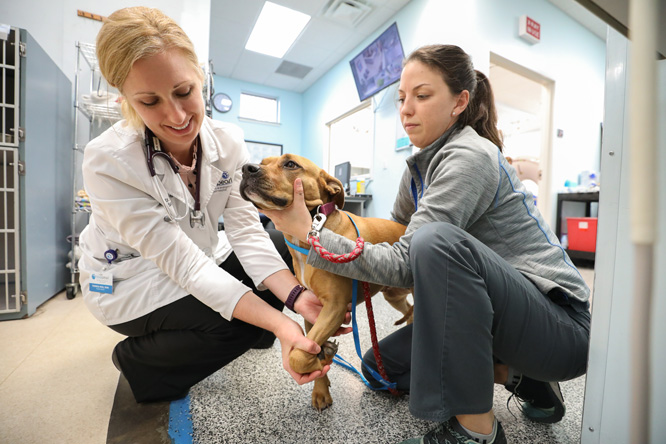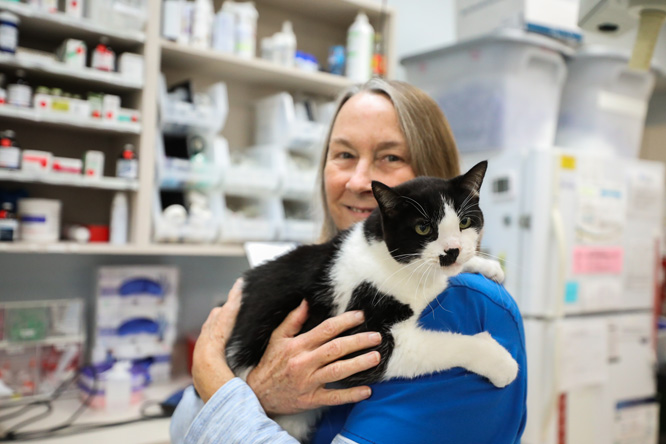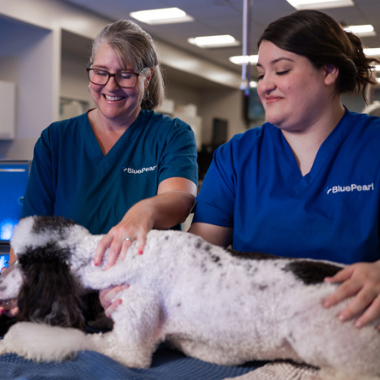Pet internal medicine by BluePearl.
Solving the puzzle to help your pet live a longer and better life.
We understand that seeing your pet experience unusual symptoms or act out of the ordinary can be stressful – especially if you don’t know what’s wrong. Fortunately, our veterinary internal medicine team is made up of experts in diagnosing and treating diseases of your pet’s various body systems, and we’re here to help.
Our commitment is not just to treat illnesses; it’s to enhance the well-being of your pet and be with you every step of the way.
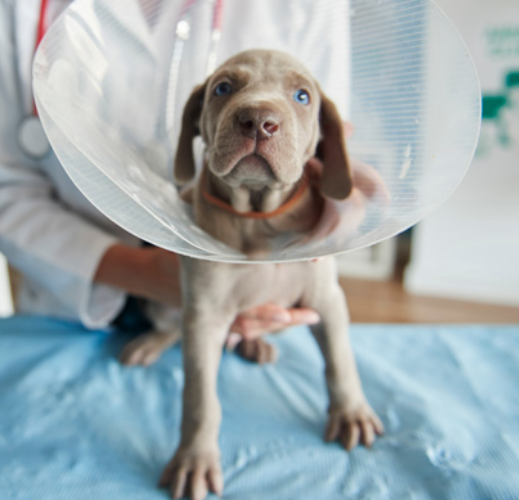
Conditions we treat.
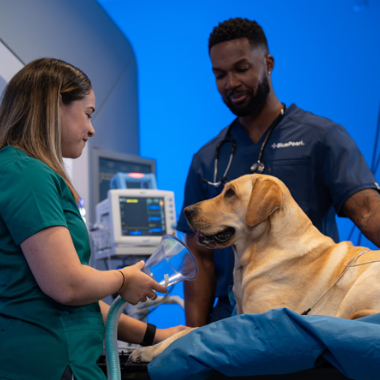
If your pet has an acute or chronic condition, you’ll have an entire internal medicine team helping to improve your pet’s quality of life so you can get back to what matters most – spending precious moments together.
- Respiratory diseases like asthma in cats or bronchitis in dogs
- Autoimmune diseases such as lupus or Addison’s disease
- Gastrointestinal diseases, including inflammatory bowel disease or pancreatitis
- Liver diseases like hepatic lipidosis or cirrhosis
- Kidney diseases such as chronic urinary infection or renal failure
- Endocrine diseases, including Cushing’s disease or diabetes mellitus
- Hematologic diseases like hemolytic anemia or thrombocytopenia
- Infectious diseases such as leptospirosis or blastomycosis
Services we offer.
Your pet will receive unparalleled medical care during their time at the hospital (and they’ll be spoiled with love and attention, too).
Advanced diagnostics
Your pet can’t tell us what’s wrong, so we use sophisticated diagnostics and imaging tools to uncover the source of the problem.
- Blood/urine testing
- Radiography (x-rays)
- Ultrasound
- Endoscopy
- Biopsies
Treatment plans
Just as no two patients are the same, neither are their treatment plans. Our internal medicine team has experience with a range of advanced procedures and minimally invasive options to get your pet on the path to wellness, including:
- Medication
- Nutritional support
- A variety of surgical options
Our board certified specialists and internal medicine team.
Experience makes all the difference.
Our internal medicine team is made up of veterinarians, vet technicians and assistants, and support staff with rigorous training and experience in specialty medicine. The team works hand in hand to provide the comprehensive, compassionate care your pet needs and deserves. Because we’re a multidisciplinary hospital, the team can consult the expertise of other specialty departments, too.
Sirima Yaemsiri
DVM, DACVIM (SAIM)Dr. Sirima Yaemsiri is particularly interested in renal disease and extracorporeal therapies such as hemodialysis and therapeutic plasma exchange. The most gratifying part of her job is building long-term relationships with clients and pets.
- Diplomate, American College of Veterinary Internal Medicine (Small Animal Internal Medicine)
- Residency, Small Animal Internal Medicine, University of California, Davis
- Internship, Small Animal Medicine & Surgery, Colorado State University, Fort Collins
- Doctor of Veterinary Medicine, North Carolina State University, Raleigh
- Bachelor of Science, Biology, University of North Carolina, Chapel Hill
When not at work, Dr. Yaemsiri enjoys being active, cooking/baking new recipes, and traveling with her husband and daughter. She is also a big fan of Chihuahuas and has two adopted geriatric Chihuahuas.
What to expect.
We want you to be prepared for your pet’s visit to the internist, so you have one less thing to worry about. Our entire BluePearl team will be with you every step of the way.
Before your visit
- Make an initial appointment by calling us directly or via referral from your pet’s primary vet.
- We’ll get records from your primary or emergency vet before your first visit and collaborate with them to discuss your pet’s history and current condition.
During your visit
- When possible, we’ll examine your pet with you by their side to make them more comfortable. If additional tests are needed for a diagnosis, we’ll discuss those options with you.
- You’ll have plenty of time and opportunity to ask questions as we go over your pet’s diagnosis together.
- Before you leave, you’ll receive a detailed treatment plan, discharge instructions and any recommended medications. We’ll schedule a recheck appointment and make sure you’re aware of any symptoms you should watch out for at home.
After your visit
- Our team will continue to partner with your primary veterinarian as part of the ongoing management of your pet’s care.
- You know your pet better than anyone, and you play a crucial role in their treatment plan. If you have any concerns about providing care at home (such as giving medication, maintaining a specific diet or monitoring your pet’s symptoms), let us know – we’re here for you.
